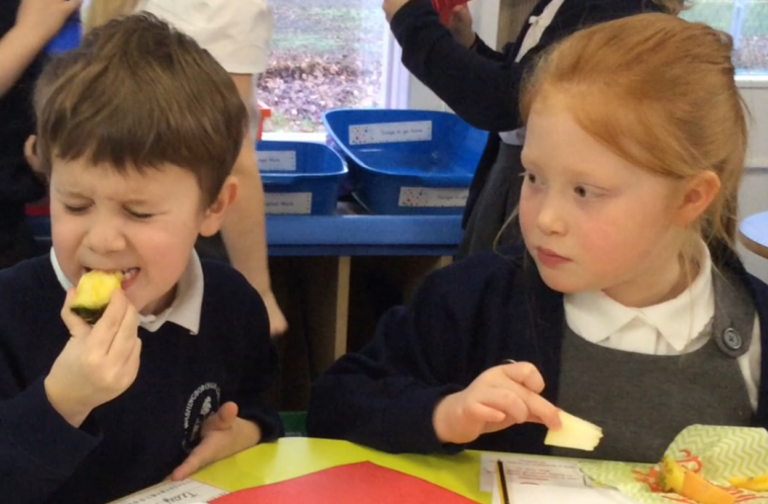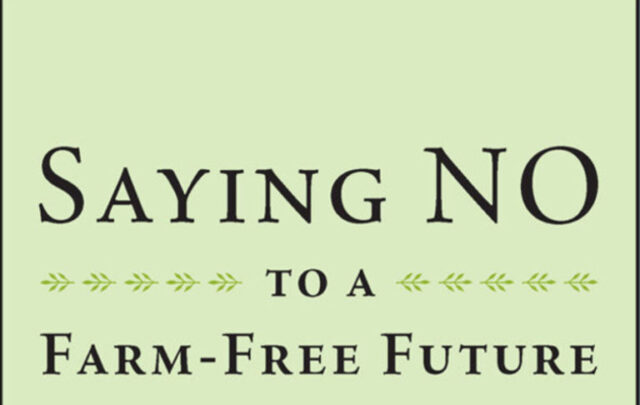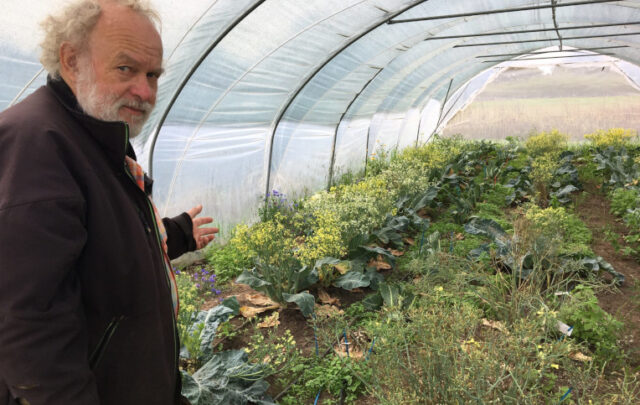A group of 5 year old children wearing ear muffs and biting into pears may sound like a bizarre way to tackle obesity, but the founders of the new sensory food education initiative Flavour School would disagree. There is a growing body of evidence suggesting that taste preferences in adulthood are closely linked to what we eat in childhood. If that diet is high in processed or ultra-processed food, it can have major implications for the future food habits and health of our children. Is it possible for children to learn, or even relearn, how to love real food?
Recent research has revealed that Britain is the highest consumer of ultra-processed food in Europe, with these foods making up over half our shopping basket. And it’s easy to see why – processed food is everywhere and very affordable. High in salt, sugar and fat, and low in nutritional value, experts believe that the abundance and consumption of these products is altering children’s palates and fuelling the obesity crisis among children. According to Public Health England, it is now estimated that one in five children are overweight or obese when they start primary school, a number that rises to one in three by the time they leave. What’s more, 600 children and teenagers were reported to have type 2 diabetes last year, a situation unheard of 17 years ago. Nutritionist Dr Courtney Scott from the Food Foundation believes the situation is “startling” and has serious concerns as to how to change children’s diets. “This is the second or third generation of people eating processed foods. If a child has grown up eating a diet that consists mainly of ultra-processed foods with high levels of salt and sugar and fat, they get used to food tasting that way. It becomes what they expect. A vegetable is just not going to taste as good.”
How these devastating statistics are addressed is complex, but it seems clear that children need to eat – and can enjoy eating – more vegetables. This is exactly what Flavour School is trying to address. The programme, which is being trialled in the UK right now, is based on the Sapere Method which was set up by French chemist and ethnologist Jacques Puisais in 1974. Puisais was concerned that children were eating an increasingly less varied diet, favouring soft and sweet foods over bitter, sour and hard foods. The word ‘Sapere’ means to ‘taste’ and ‘to know’ in Latin and is precisely what the programme is promoting. Rather than teaching children how to cook, it aims at encouraging children to experience food using all five of their senses.
“The knowledge about food that determines someone’s future food preferences happens not at a logical level but through the senses. Until you can truly know a food, and decide whether you like it or not, you need to have interacted with it and this happens through the senses: touch, smell, hearing and sight as well as taste.”
 For example, children might be given carrots that are grated, sliced, cooked and juiced, all to investigate with their senses. Each preparation will give the child a different experience which they then describe. By arousing children’s curiosity in the food, they become familiar with it and find new ways of describing it. They become empowered and confident, realising that food can be more than just delicious or disgusting. It can be sour, crunchy, airy or spiky. This also has the added benefit of improving children’s vocabulary. There are few rules, but two things are clear: it’s about experiencing food, not cooking, and there is no pressure to try anything.
For example, children might be given carrots that are grated, sliced, cooked and juiced, all to investigate with their senses. Each preparation will give the child a different experience which they then describe. By arousing children’s curiosity in the food, they become familiar with it and find new ways of describing it. They become empowered and confident, realising that food can be more than just delicious or disgusting. It can be sour, crunchy, airy or spiky. This also has the added benefit of improving children’s vocabulary. There are few rules, but two things are clear: it’s about experiencing food, not cooking, and there is no pressure to try anything.
Bee Wilson, who is one of the founders of Flavour School, writes about the Sapere method in her book First Bite. The method is used in parts of France, Switzerland and the Netherlands as well as in many schools in Sweden. It’s biggest triumph so far is in Finland where, during the 2000s, obesity levels amongst young people were rising. The Finnish Government, concerned about the future health of these young people, proceeded to fund the Sapere method in all kindergartens across the country along with other food education programmes. Anecdotal evidence has shown promising results, with children eating a more varied diet and having a broadly healthier attitude to food. What’s more, obesity levels appear to be dropping.
“The changes to eating behaviour set in motion by this type of ‘sensory education’, are profound. It is not about learning to like this or that vegetable but developing an overall attitude to eating that is more open to variety and less governed by the simple sugar-salt-fat palate of junk food,” says Bee Wilson in First Bite.
This story is a familiar one for Britain, yet up until now nothing like Sapere has ever been used. Thanks to Bee Wilson and a collective of other researchers, educators and food sustainability professionals, it is now being piloted across the UK through Flavour School. The progamme is aimed at 4-6 year olds, but anyone can benefit from the method, and as children get older it can be integrated into other parts of the curriculum. For example, by listening to the sound food makes, the anatomy of the ear can be taught, and when talking about the origins of the potato, history and culture can be introduced. The teaching manual is available for anyone to use and interest has been high. Most of the interest has come from the UK via the Flavour School website and word of mouth, but there have also been enquiries from the US, Ireland, Australia and New Zealand. Geraldine Gilbert, one of the Flavour School founders believes part of its beauty is in its simplicity. “It’s easy to roll out in schools. It’s not a cooking class so it doesn’t need much equipment and can be done in 10 minutes.”
Jason O’Rourke, headmaster at Washingborough Academy in Lincolnshire and one of the founders of Flavour School is something of a maverick in food education. His school has been a case study for the Government’s childhood obesity plan and food education is embedded into every part of school life. Food education is not compulsory in schools but O’Rourke sees it as a vital tool for life. “Learning fractions is not going lengthen lives but learning about proper food will,” he says. He has refitted the school kitchen and brought in a chef to cater for the children, but there is still a long way to go. Packed lunches that are full of sugar and chocolate are commonplace and he still believes parents who haven’t benefitted from food education are imposing their own food hang-ups on their children. The Flavour School teaching manual says, “A child who has never tasted broccoli is unlikely to become an adult who enjoys eating it.”
So far, the impact of Flavour School at Washingborough Academy has been really positive. There are not many people who can get young children to try herring, smoked haddock, salmon and anchovies, but during a Flavour School class they do. Once children have smelled, touched, inspected and listened to the food, their curiosity often gets the better of them, not least so they don’t get left out.
 The classes also provide a wonderful opportunity for language development. Smell is integral to taste, yet how often have you really tried to describe how something smells? It requires a certain amount of creativity. O’Rourke recalls children using touch/feel bags of food and saying “it smells like my Grandad’s garden” or “like the ocean” or it feels “prickly”.
The classes also provide a wonderful opportunity for language development. Smell is integral to taste, yet how often have you really tried to describe how something smells? It requires a certain amount of creativity. O’Rourke recalls children using touch/feel bags of food and saying “it smells like my Grandad’s garden” or “like the ocean” or it feels “prickly”.
Children are also able to experience a wider variety of foods, so more than just a Granny Smith Apple or a Conference Pear. In Washingborough, they have been trying different types of apples that grow in their orchard, each with their own unique taste, story and appearance. According to O’Rourke, the classes were so successful that one child dragged his parents to the supermarket after school, to try different varieties of apples.
Flavour School is still in its infancy, but it’s already gaining momentum. They are piloting a roll-out of the programme in nurseries across Warwickshire, in partnership with the Soil Association’s Food For Life programme, and are about to embark on a new research project. Up until now the results have only been anecdotal but the next step is to get some solid evidence on its impact, with the end goal that it becomes part of the national curriculum, just like in Finland.
The founders of Flavour School are by no means expecting the programme to eradicate obesity or change our highly dysfunctional food system, on its own. Yet, by encouraging children to experience food through the senses and become more confident in trying new things, it might just help spark a change in food habits and taste preferences that have become so ingrained over the last 30 years.





